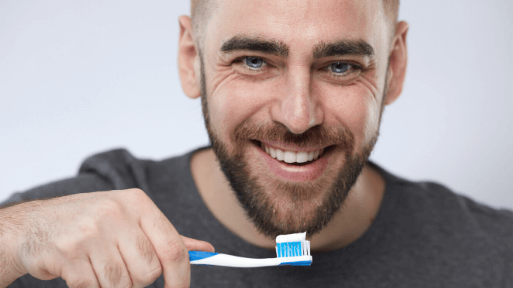 Brushing your teeth is the foundation of good oral care. According to the American Dental Association, both electric and manual toothbrushes are effective at removing oral plaque that can cause tooth decay and disease. But is one better than the other? Read below for more information about each option to help you decide which might be best for you.
Brushing your teeth is the foundation of good oral care. According to the American Dental Association, both electric and manual toothbrushes are effective at removing oral plaque that can cause tooth decay and disease. But is one better than the other? Read below for more information about each option to help you decide which might be best for you.
Perks of Electric Toothbrushes
More effective at cleaning
Several studies show, in general, electric toothbrushes are more effective at decreasing plaque levels and the risk of gingivitis than manual toothbrushes.
Easier for people with mobility issues
For those with arthritis, carpal tunnel, or any condition that may reduce mobility in the hands and arms, electric toothbrushes are an easier option because they do most of the hard work for you and require less grip and overall movement.
Built-in timers
A lot of us don’t brush our teeth for as long as we should (which is two minutes, by the way). Another perk of electric toothbrushes is that they include built-in timers to ensure you brush for the recommended amount of time. Other sensors included in some electric models include:
- Several brushing modes for sensitive teeth, whitening benefits, or a gum-massaging setting
- Pressure sensors to signal when you’re brushing too hard or too softly
- Digital reminders to replace your brush head
Easier for people with braces
Oral care is generally more difficult for those with braces or other orthodontic appliances, but studies have found electric toothbrushes can help make it easier and more effective.
Cons of Electric Toothbrushes
Cost
Simply put, electric toothbrushes are more expensive than manual ones. Prices can range anywhere from $15 to $250 per brush and new replacement brush heads can be higher in price.
Not always convenient
Electric toothbrushes and their replacement brush heads may not always be easy or convenient to find because not all stories carry them. While you can purchase them online, that isn’t necessarily convenient for everyone and will not be as immediate as stopping by a store.
Manual Toothbrush Benefits
They’re accessible
Manual toothbrushes have been around a long time and are still an effective, accessible tool for cleaning your teeth, removing bacteria, and preventing gingivitis. You can buy one at almost any grocery store, gas station, or pharmacy. They’re also easy to travel with and don’t need to be charged to work, so you can use one anywhere and at any time.
Affordable
They’re a more affordable option than electric toothbrushes. Typically, you can buy one for $1 to $3. And they’re usually given away for free when you visit the dentist!
Manual Toothbrush Cons
User error
People don’t always use manual brushes correctly. In fact, studies have found that people are more likely to brush too hard if they used a manual toothbrush versus electric, which can cause damage to your gums. Using a manual toothbrush may also make it more difficult to know if you’re brushing long enough for every session since there’s no built-in timer.
The Takeaway
Overall, the debate between electric toothbrush versus manual toothbrush is ultimately one of personal preference. The best toothbrush for you is one that you’re going to use with good technique at least twice a day.
Schedule an Appointment Today
Need help deciding which toothbrush is right for you? Make an appointment with us today. We’d be glad to help you better understand all the ways in which we work to protect your oral health.

